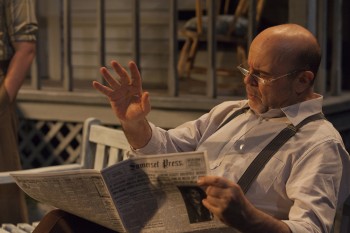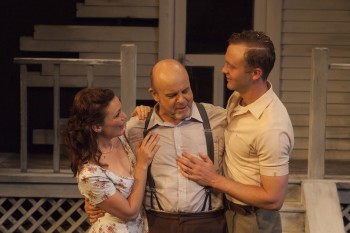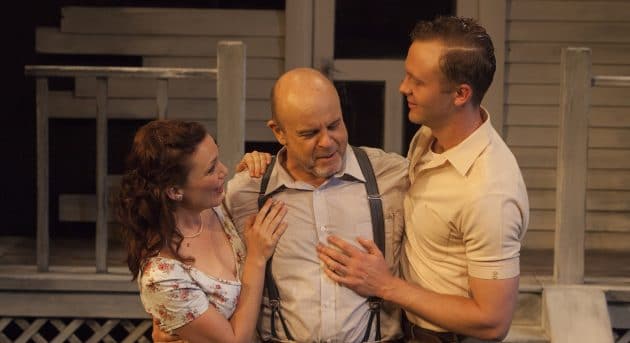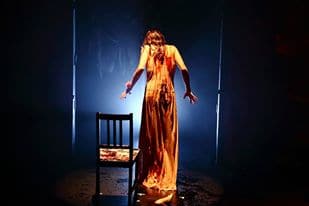All My Sons – Darlinghurst Theatre Company
The Darlinghurst Theatre Company has moved into its new home, a new theatre for Sydney. The Eternity Playhouse is a 126 year old heritage listed building, and it is stunning; one walks in and feels a sense of wonder. The theatre itself is inviting, intimate, and built with a sense of gravity. It is a structure that is worthy of good theatre.
The first production of Darlinghurst’s season, Arthur Miller’s All My Sons, is a gift, just as the building is a gift. It is a considered and thoughtful production that brings the classic to life as a classic; there is no radical re-invention here. But there doesn’t need to be.

Under the direction of Iain Sinclair, the 1947 play is a pressure-cooker of family secrets and shattered ideals, but it is also thoughtful, especially as it probes into such private, unspoken places like grief, and love, and closely-guarded fear. It’s a remarkably naked production that takes a highly-regarded play and, by offering it up with sincerity, reminds one why it’s so well-regarded.
It’s the story of the Keller family after the second world war. Son Larry went missing in action three years ago and his mother mourns, even while his brother is trying to move forward in life and in love – his eye fixed on Ann, Larry’s girlfriend, who he plans to marry.
Joe, family patriarch, was exonerated from claims he intentionally sent faulty cylinder heads to the Air Force; neighbour and colleague Steve was convicted and imprisoned. His daughter, of course, is Ann. But the past won’t stay buried, and Ann’s brother George, won’t let it.
All My Sons is a product of its times, but still has clear relevance in a time like now; we never have memories from devastating past wars that doesn’t brush up against new ones. Remote actions resulting in death these might make you think these days of drones and not faulty parts, but there’s enough to resonate: political and commercial threads about the profitability and tragedy of war, families destroyed through death or betrayal, the loss of identity that comes from comfort, from your sense of home, the world, and family changing before your eyes. You do not have to look hard to find poignancy in All My Sons, and Darlinghurst invites you to look so closely you can almost touch it.

The performances are superb, and the ensemble understands the dynamics of suburban neighbourhood with cohesive, familiar affect. At the heart of the story, of course, is Marshall Napier’s Joe. Salt of the earth, charming, and affable, he leaves a lasting impression because Napier has let Joe be motivated, as he must be, by fear; fear, shame, and twenty-two ghosts.
Visceral in her maternal sorrow was Kate (Toni Scanlan); a woman wracked by grief and guilt. She looked into the eyes of her fellow characters and begged them to live in her reality, where her son might still be alive, and it was chilling, relatable, devastating.
Son Chris is played by Andrew Henry, whose story plays out exquisitely across his body; entire stories of anguish are told in the grasping and clasping of his hands, the flexing and tensing of his fingers. He plays simplicity, not stupidity, and it’s endearing, humbling.
Anne (Meredith Penman), as the other half of the young couple, is a standout. Her freshness and the lack of guile in her open expression and vulnerably large eyes – ready for tears, when they were needed – was something new and exciting; this was no re-tread of the ingénue trope; this was a fully realised young woman.
Sound (by Nate Edmondon) was subtle, naturalistic, and foreboding – the right mix for a play that builds its intensity and shapes it over long notes; suggestions of aural memories are delicate enough to be poignant. Perhaps the biggest surprise and triumph about the sound were the acoustics in the Eternity Playhouse – all the dialogue was easy to hear, and nothing was lost for want of the effect of a murmured aside.

Design (by Luke Ede) emphasised the way the stage rolls out to the audience seating like a shoreline; the yard was well-defined and well-built; the porch lived-in and welcoming. Staying fairly true to Miller’s original stage direction, illuminating figures behind the screen door (lighting courtesy of Nicholas Rayment) added a welcome sense of depth to the fixed set, just as the catalysing blown-down tree centred and focused the audience’s range of vision.
A strong play, a strong cast, and strong production values. Welcome back to the Darlinghurst Theatre Company, and welcome to the Eternity Playhouse – we’re lucky to have you.



